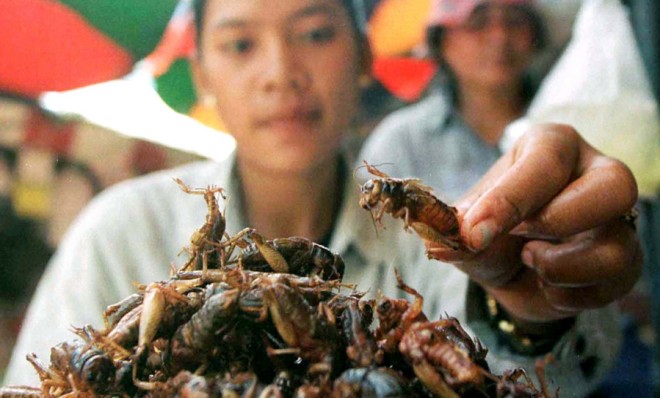5 reasons the U.N. wants you to start eating insects
Cricket kebabs, anyone?

A free daily email with the biggest news stories of the day – and the best features from TheWeek.com
You are now subscribed
Your newsletter sign-up was successful
Should adventurous foodies consider replacing foie gras and sweetbreads with grasshoppers and maguey worms? That's what a new report from the United Nations' Food and Agriculture Organization (FAO) is recommending.
The study's authors concede that there is a "disgust factor" that prevents people around the world from eating bugs. But there are plenty of good reasons (okay, five) to put down that steak and shove a wriggling insect into your mouth:
1. They are good for you
The Week
Escape your echo chamber. Get the facts behind the news, plus analysis from multiple perspectives.

Sign up for The Week's Free Newsletters
From our morning news briefing to a weekly Good News Newsletter, get the best of The Week delivered directly to your inbox.
From our morning news briefing to a weekly Good News Newsletter, get the best of The Week delivered directly to your inbox.
The FAO estimates that there are between 1,000 and 1,900 edible insect species. As a result, espousing the nutritional benefits of insects as a whole is tricky, akin to saying all mammals are good for you even though braised rabbit and bacon obviously have entirely different nutritional qualities.
In general, however, the FAO says that insects are a "highly nutritious and healthy food source" chock-full of protein, vitamins, and fiber. Looking to score some omega-3s? Eating mealworms will give you the same amount of the healthy fats as eating fish.
2. They are better for the environment
Environmentalists on the Atkins Diet take notice: To produce the same amount of protein as crickets, cattle need 12 times the feed, while chicken and pigs require double the feed, according to the FAO. Less feed means less resources are needed to make your meal.
A free daily email with the biggest news stories of the day – and the best features from TheWeek.com
Insects also don't emit as much methane and ammonia as traditional livestock do. Another plus? They can be reared on "organic side-streams," which is a more palatable way of saying human and animal waste. We can't wait to see that on an insect-burger ad campaign.
3. You eat lobster, don't you?
Once, lobster and shrimp (which, like tarantulas and centipedes, are arthropods) were considered "poor-man's food" unfit for refined palates. Now the butter-poached Nova Scotia lobster at New York City's Michelin-starred Ai Fiori will cost you $40. The lesson here is that what we consider disgusting isn't always determined by our tongues. The FAO quotes naturalist Joseph Charles Bequaert:
What we eat is, after all, more a matter of custom and fashion than anything else… It can be attributed only to prejudice,that civilized man of today shows such a decided aversion to including any six-legged creatures in his diet. [FAO]
4. They are good for economic development
Starting a cattle farm, especially in the developing world, can be costly. According to the FAO, raising insects is a great option for poor rural farmers without the money or know-how to raise traditional livestock. Insects take up little space, are easy to raise, and reproduce quickly for a fast return on an initial investment.
5. Plenty of people already eat them
The FAO estimates that insects are already eaten regularly by 2 billion people worldwide, especially in tropical countries where insects are big and plentiful, as well as in the more temperate climates of China, Japan, and Mexico. What is it going to take to make insects popular in the United States? We're looking at you, Andrew Zimmern.
Keith Wagstaff is a staff writer at TheWeek.com covering politics and current events. He has previously written for such publications as TIME, Details, VICE, and the Village Voice.
-
 Sepsis ‘breakthrough’: the world’s first targeted treatment?
Sepsis ‘breakthrough’: the world’s first targeted treatment?The Explainer New drug could reverse effects of sepsis, rather than trying to treat infection with antibiotics
-
 James Van Der Beek obituary: fresh-faced Dawson’s Creek star
James Van Der Beek obituary: fresh-faced Dawson’s Creek starIn The Spotlight Van Der Beek fronted one of the most successful teen dramas of the 90s – but his Dawson fame proved a double-edged sword
-
 Is Andrew’s arrest the end for the monarchy?
Is Andrew’s arrest the end for the monarchy?Today's Big Question The King has distanced the royal family from his disgraced brother but critics claim a ‘fit of revolutionary disgust’ could still wipe them out